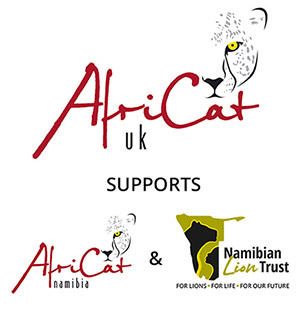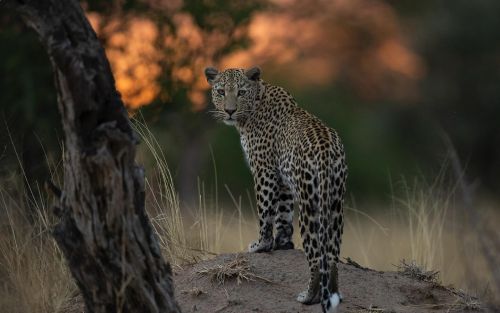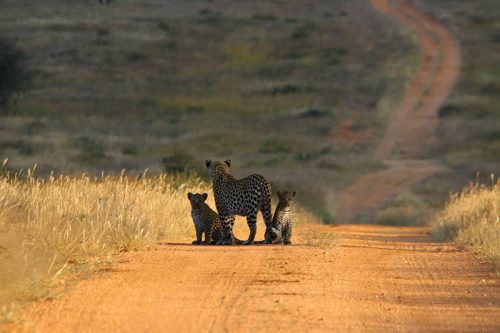STAY IN TOUCH WITH OUR BI-MONTHLY AFRICAT UK NEWSLETTER
AFRICAT UK UPDATES
International Leopard Day, 3rd May
The leopard Panthera pardus hardly needs an introduction! They have many qualities and characteristics that help them to survive in the increasingly challenging world they now must inhabit.
Indeed, leopards are the most versatile and adaptable of the ‘big cats’, both in terms of the habitat where they can survive and the prey species they consume. Despite this adaptability, leopards have lost 75% of their historical distribution. As a species, the leopard is classified as vulnerable by the International Union for Conservation of Nature (IUCN) Red List of Threatened Species, and the current population trend is decreasing.
Leopards are however not easily seen and are frequently described as elusive. Leopards are high on the list of species that want to be seen by travellers and visitors to the bush.
There are nine sub species of leopard, some of which are critically endangered. All have seen a reduction in habitat and persecution from humans. They are found in Africa and across Asia.
International Leopard Day 3rd May
The leopard Panthera pardus hardly needs an introduction! They have many qualities and characteristics that help them to survive in the increasingly challenging world they now must inhabit.
Indeed, leopards are the most versatile and adaptable of the ‘big cats’, both in terms of the habitat where they can survive and the prey species they consume. Despite this adaptability, leopards have lost 75% of their historical distribution. As a species, the leopard is classified as vulnerable by the International Union for Conservation of Nature (IUCN) Red List of Threatened Species, and the current population trend is decreasing.
Leopards are however not easily seen and are frequently described as elusive. Leopards are high on the list of species that want to be seen by travellers and visitors to the bush.
There are nine sub species of leopard, some of which are critically endangered. All have seen a reduction in habitat and persecution from humans. They are found in Africa and across Asia.
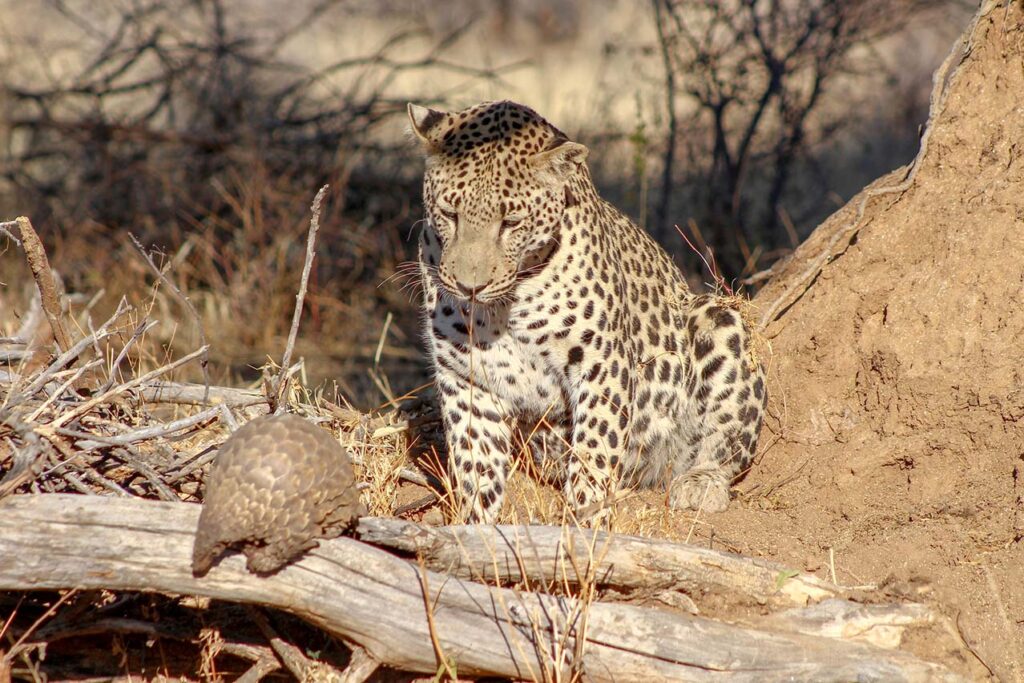
Some interesting information about leopards:
They are apex predators – top of the food chain and help to maintain a healthy ecosystem.
Being charismatic leopards help with promoting conservation and environmental education.
Leopards can climb trees and are often spotted up in trees.
Leopards are stealthy solitary hunters who generally hunt in the dusk or dark, and can disappear without a sound.
Leopards know instinctively how to hunt and while cubs stay with their mum until fully grown rarely do they hunt together.
Leopards play a key role in supporting a balance within their ecosystem.
Leopards are opportunistic and will eat a wide variety of prey.
Leopards are sometimes confused with cheetah. Cheetah have the black ‘tear lines’ on their faces; a different spot pattern; are a much lighter build and tend to hunt more in the daytime. The jaguar is native to the America’s and plays a similar role to the leopard within that ecosystem.
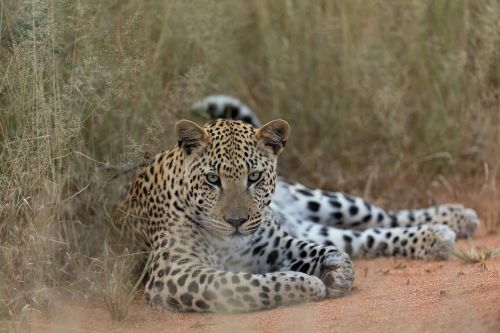
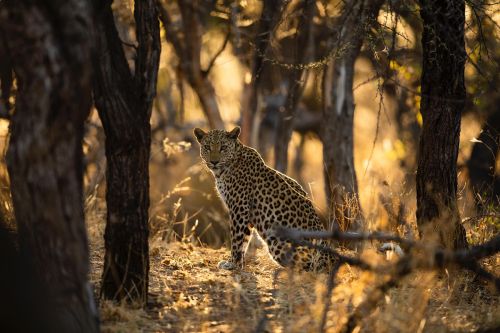
African Leopards are found in the Okonjima Nature Reserve in Namibia.
Leopards were the subject of some of the earliest research work undertaken by the AfriCat Foundation in the early 1990’s. The goal at the time was to understand leopard behaviour so that strategies could be developed to run a successful cattle farm without losing calves to leopards or other predators.
In the last 20 years or so technology developments have transformed leopard and other field studies of animal behaviour. Now it’s possible, with the correct kit, to know where any leopard is by checking a smart phone! Once the Okonjima Nature Reserve was fenced with predator proof fences: (in theory at least – it’s known some leopards have learnt to find their way both in and out!) – leopard numbers in the reserve have increased leading, at times, to conflict especially between rival males.
Recent research investigated the size of territories and those within the reserve are smaller than the norm. This is down to an abundant and varied prey meaning the leopards have found they can afford to reduce their territory size and coexist. The reserve also carries a high density of the less well known and rarer brown hyena, which again is a consequence of the fence.
Fascinating interactions and behaviours between the two species have been observed. Staying at Okonjima gives guests a chance of seeing leopard, some of whom are collared for research purposes, making them easier to find with correct skills and equipment. The current research focus for the team at The AfriCat Foudation is around the issues of managing an island reserve where animals cannot, in the main, move out of the reserve as will.
Thank You Blair Drummond Safari Park for your support of the Namibian Lion Trust.
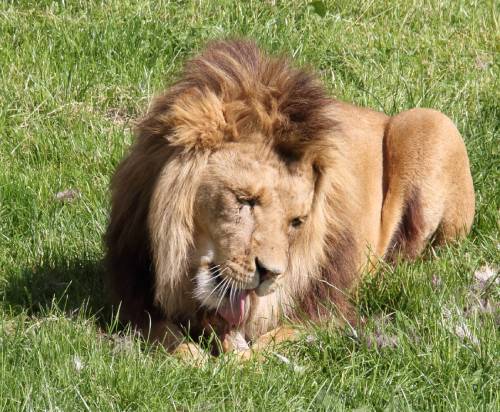
The keepers and staff of Blair Drummond Safari Park select charities to work with through their Link to the Wild programme. The team on site give talks and find other ways to engage members of the public about the plight of the rare and endangered animals they can see in the park.
The number of lions across Africa have plummeted. Habitat loss and fragmentation of their range means there are just half the lions roaming Africa than there were 30 years ago. In fact, there are now thought to be now more white and black rhinos than lions living wild in Africa.
Thanks to the dedication and hard work of the staff at Blair Drummond together with the generosity of the visitors the Nambian Lion Trust is the very grateful recipient of £2,200. A ROAR of appreciation and thanks to everyone from the lions and the Lion Guards in Namibia.
If you are passing the Safari Park or planning a trip to the Stirling area, then book a visit.
Namibian Lion Trust T-shirts designed by Leading London Fashion Designer, Daniel James
The Namibian Lion Trust are super-excited to announce a ground-breaking initiative in wildlife conservation.
Today we are launching a unique range of specialist designer clothing based on the fusion of the core values of Fashion, Rock ‘n’ Roll and Conservation, and designed from the outset in support of the Namibian Lion Trust.
Leading London Fashion Designer, Daniel James, has very kindly designed a unique range of clothing incorporating specialist features that combine style with practicality, functionality with flair.
All profits/proceeds come directly to us at the Namibian Lion Trust.
Namibian Lion Trust T-shirts designed by Leading London Fashion Designer, Daniel James
World Rhino Day is a day of awareness for all five rhino species and the work being done to save them by rhino experts and advocates around the world.
Okonjima Nature Reserve is home to a small number of White Rhino, which are a treat to see in their natural habitat. Those staying at Okonjima can arrange to visit them, in certain circumstances this may be on foot.
White Rhinos are struggling as they continue to be poached for their horn, which is nothing more than what your nails are made of. Really sadly some people still hold onto a belief that it has healing properties – it does not. As the horn has value on the black market these magnificent creatures are still slaughtered and worse still have their horns cut off with chain saws and then left to die.
One of Daniel’s many celebrity clients is Ronnie Woods of the Rolling Stones! Daniel designs all of Ronnie’s stage outfits and Ronnie has very kindly donated one of his specially-commissioned Lion artworks to be printed on a one-off T-shirt for our unique use. – All proceeds come directly to us at the Namibian Lion Trust.
Ronnie has been supporting conservation efforts for many years and we are very grateful for his support with this project.
With Christmas around the corner one of these specially designed t-shirts or sweatshirts would make a lovely present.
Please follow the link below to go directly to Daniels James’s website to see the whole collection he has designed alongside, as well as the very special Ronnie Woods Lion artwork T-shirt or use the QR code.
Shop now and support the work of the Namibian Lion Trust
For more information about The Namibian Lion Trust please visit their website.

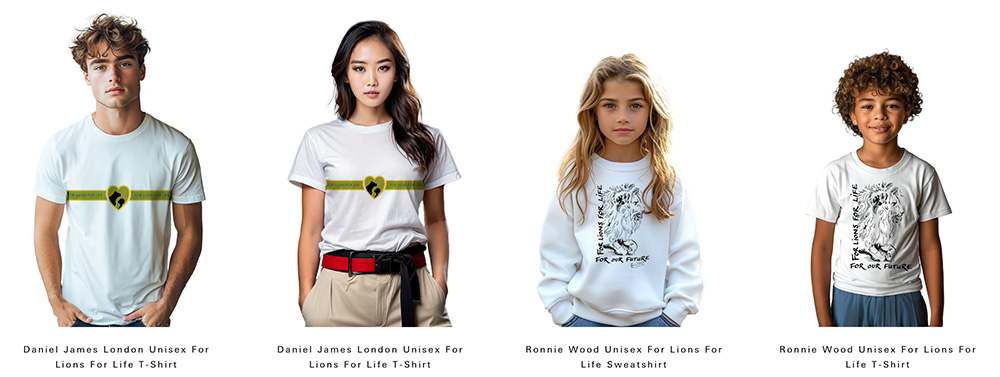
Thank you from the AfriCat UK Board
We have been delighted to see the funds coming in from a range of sources.
The AfriCat UK online shop has increased its range of goods and includes mugs, cards water bottles as well as a range of other items. It is worth checking out from time to time as things do get added. If there is something particular you are after, do email janet@africat.co.uk with the detail of what you would like and it may be possible to design it for you. Please allow plenty of time.
The new Namibian Lion Trust merchandise from London Fashion Designer Daniel James has been well received and sales have been steady especially in the run up to Christmas. They do make excellent presents for all ages.

Easyfundraising continues to be popular and is an excellent way to help AfriCat UK without costing you a penny, please spread the word and if you have not signed up yet please do. The shop you purchase the goods from give us a small percentage of the time cost.
We have been delighted to see that people have been making donations via Benevity which is a corporate platform that enables people across the world to donate to charities of their choice.
We are very grateful to be remembered by a recent friend of AfriCat UK in their will and will ensure their generosity is used to good advantage.
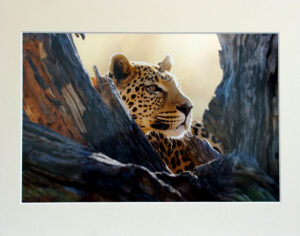
There is still a supply of prints taken by Chris Packham you can purchase.
Check out the details in the shop section of the website.
In 2025 we hope to expand and increase the ways people can support AfriCat UK and The Namibian Lion Trust. Any suggestions and ideas are most welcome.
AfriCat UK
The AfriCat UK Board.
The three current Trustees of AfriCat UK are Frank Horan as Chairman, Charlotte Shipton and Janet Widdows. In addition, we have keen supporters of the work in Namibia who assist the Board with various tasks and our longstanding Patrons and Ambassadors. The Board is keen to hear from anyone who would like to help with fundraising, tasks associated with running the charity or those willing to join the Board.
Any offers of help are most welcome, please contact either Frank or Janet or Charlotte
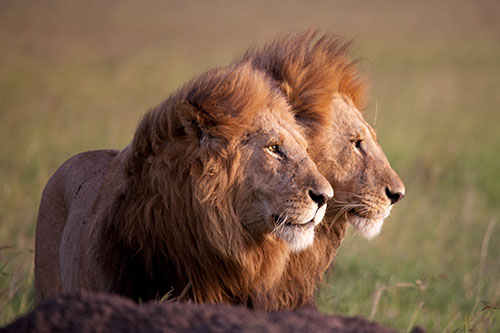
AfriCat UK’s Vision
To contribute towards the conservation efforts of the Namibian charities who work to conserve suitable habitat and environments where carnivores and endangered species can thrive and survive. This work will involve education, research and working with local communities.
Misson Statement
To promote the need for conservation of the natural world for all in Namibia. To work with local charities supporting their projects and initiatives. This will include but not be limited too, awareness raising of issues in the UK, Namibia and the wider world; supporting local educational initiatives; fundraising; promoting visits to the region and Okonjima; encouraging and sharing relevant research work; working to reduce human wildlife conflict and to involve local communities with all relevant activities.
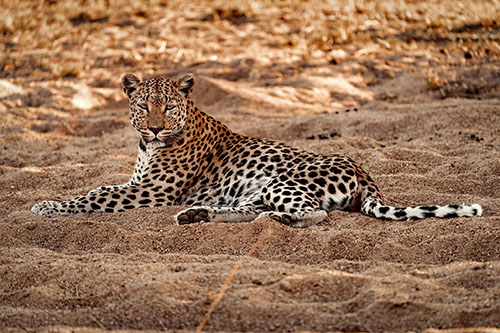
Contacting AfriCat UK
correspondence address: 5 Brackendale Way, Reading, Berkshire RG6 1DZ
phone: landline 0118 935 1681 (please leave a message if no reply)
email address: support@africat.co.uk has replaced info-uk@africat.org but anything sent to the old email is being forwarded and we will reply.
AfriCat UK board members can be contacted with their first name followed by @africat.co.uk
website: www.africat.co.uk
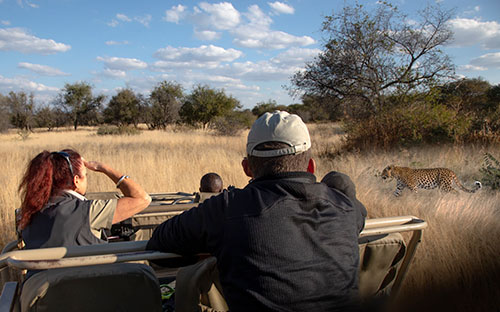
AfriCat - Behind the Scenes
The AfriCat Foundation welcomes Okonjima guests to come behind the scenes to learn first-hand about the work of the Foundation.
The AfriCat Behind The Scenes programme is available for groups of guests between 4 to 8 pax booked into the Okonjima Bush Camp or Luxury Villa for at least three nights on a fully inclusive basis.
This experience will give you a deeper insight into our research projects, such as the Brown Hyaena, Pangolin, the Leopard and other endangered species. Guests will be able to see and participate in AfriCat work that can be scheduled for the time of the visit such as re-collaring as well as the option of meeting the “AfriCat ambassador carnivores” that are in the care of AfriCat.
For more information please visit: AfriCat Behind the Scenes
Since 2014, AfriCat UK (UK Charity Commission Number 1120026) has supported The AfriCat Foundation and The Namibian Lion Trust (Formerly AfriCat North). AfriCat UK raises funds for the various programs that have been developed by the Namibian charities to assist in research of key species, research of solutions to Human Wildlife Conflict, and the education of local communities in Namibia.
We have successfully funded research that has assisted in the better understanding of the Cheetah, Pangolin, Leopard, Lion, and Hyenas. AfriCat UK have funded the building of a school for local communities to improve the link in conservation and education for future generations. Many world renowned veterinary clinicians have based their research and resultant doctorates on the animals and facilities that can be found at the two charities in Namibia that we continue to fund. The importance of this research allows for wide-spread conservation initiatives that impact species globally.

